Call to Arms: Modern LGBTQ+ Fiction of the Second World War, Various Authors
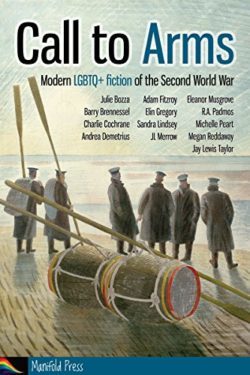 Rating: 5 Stars
Rating: 5 Stars
Publisher: Manifold Press
Genre: LGBTQ+ Fiction
Tags: Historical – WWII Short Stories
Length: 272 Pages
Reviewer: Kazza K
Purchase At: amazon.com, Manifold Press
Blurb:
Seventeen stories, thirteen authors, a second war. Once again Manifold Press’s writers explore the lives of LGBTQ+ people and their war-time experience in cities, towns and countryside across the world.
Amidst war and peace, in the thick of violence or in an unexpected lull, these stories of the Second World War take the reader far and wide: through Britain, Europe, Asia and South America, from loss and parting to love and homecoming. As for home, it may be an ordinary house, or a prison camp, or a ship: but it is, in the end, where you find it, however far you have to go. Read this book, and make the journey yourself.
An anthology edited by Heloise Mezen and featuring authors: Julie Bozza; Barry Brennessel; Charlie Cochrane; Andrea Demetrius; Adam Fitzroy; Elin Gregory; Sandra Lindsey; JL Merrow; Eleanor Musgrove; R.A. Padmos; Michelle Peart; Megan Reddaway; Jay Lewis Taylor.
.
Review:
All of the stories in this anthology are reviewed here and they appear in the order they are placed within the anthology. Each author is next to the title with a link to Goodreads in case you are interested in their general writing. The authors have all donated their time and their stories and the proceeds of the sale of this book goes to the Refugee Council refugeecouncil.org.uk This is such a worthwhile cause as there are so many refugees as of November 2017, more than in WWII. So many displaced people in the world who need our help. Not wanting to turn this into anything political but I just want to add that we need absolute compassion now, not so much in a world war but in a world at war. I also think it’s incredibly important to try and place ourselves in someone else’s shoes for a while and give thought to – there but for the grace of God, go I.
.
1) An Affirming Flame – Jay Lewis Taylor
Patrick is a student and music/English teacher to an affluent German family in Berlin. He’s about to return to England when he discovers that Felix, another young man who was a student with him at the Konservatorium, someone he is intimate with, is also leaving. It’s different though, Patrick isn’t Jewish and he can leave on a train of his choosing to his correct destination. Felix and his family have plans to leave for New York but they’re Jewish and it’s an unknown if that would even be possible.
“Our ticket is for Monday. Third of July, I’ve been saying that time and time again, like a spell. Third of July, nineteen thirty-nine, we’ll be gone.” Felix was still looking at him, intently.
Suddenly the feel to Berlin is very different. The tension. The air. The people.
She closed the door behind him and went out noiselessly. All the people he knew were walking quietly today, he thought: the girls at the Albrecht house, and now Debora. Only the strangers and the horses on the road made a noise; as if they were real, and he and his friends were walking in a dream.
When Felix gives a musical score to Patrick, who agrees to play it with his window open later that night, something he calls Für Patrick, I had a moment. There is so much more behind it than the music itself.
Patrick does leave the next day, but not on the train he had a ticket for. As he’s contemplating Felix, his fate, and what to do next, he notices a train with only children boarding and emotional farewells being made. It’s a good thing Patrick speaks German as well as English because he may bot have been able to help the Hirsches, but another opportunity comes his way when a translator has ‘disappeared’.
At length, after being passed from office to office, he asked the question for the fourth time.
“Sachs? Josef Sachs?” The laughter was scornful. “Jude. Was erwarten Sie?” The official shrugged, and turned away.
This story fires up so many emotions. A touching and bittersweet story that is solidly based on historical events and attitudes and an outlook of if only I’d known. I also spent half of the story hoping there would be a letter.
.
2) Extraordinary Duties – Elin Gregory
A very short story about people who served their country at home in England during WWII but no one knew about them. Auxiliary Units that were in place in case of an invasion on home soil. Apparently this will be a longer novel later on. Based on this snippet I look forward to that book.
3) The Boy Left Behind – Eleanor Musgrove
This is a short-story sequel to the original short about Henry and Rosie from A Pride of Poppies. Henry and Rosie are still together and happy, despite another world war. WWI brought them together and now another world war has a new impact on their lives. Henry is sad it’s not possible for Rosie to have children because Henry – birth name Henrietta – is (what we now know as) a trans male. They live together in a house Rosie inherited, and people in their town know about their relationship, but don’t understand it. Except Henry’s brother Peter, who was wounded in WWI, is very supportive and helpful.
A chance comes up to billet a child from London and they end up with Tom, the only child not offered a home. If that weren’t the case, if Tom wasn’t the boy left behind, the billeting officer would never have given Henry and Rosie a child to look after. Tom initially refers to Henry as mister and then works out that Henry may look and dress like a man but there is undeniable female anatomy. He has a few questions but is pretty accepting because Rosie and Henry and Peter are good people who are adept at simplifying details. A nice addition to the anthology and nice to see two characters I remembered immediately having a sequel.
“How come you dress like a man, mister? And … and you don’t mind me calling you mister?”
“Being a woman never really felt right. Does that make any sense?”
“Like how my mum supports Arsenal but I like West Ham more, but sometimes she says I should cheer for Arsenal anyway and it makes me get a horrible feeling in my tummy?”
“Er … a bit like that, I suppose. You’re cheering for Arsenal, but really, deep down, you know you’re a West Ham fan.”
“Yeah! That makes sense.”
4) The Man Who Loved Pigs – Megan Reddaway
Mike is a wireless operator for Security Services and likes a drink at a ‘friendly’ pub in Soho, the Rose and Thorns. It’s here that he meets a pub newcomer in Eddy, a handsome young man who’s in between working on farms and who has a particular penchant for pigs –
“Mike laughed and moved an inch nearer. “You like pigs?”
Eddy bit his lip. “I love them. I know it’s funny, but I do. They’re intelligent and affectionate – like dogs, almost. They’re not the dirty, smelly, greedy creatures that city people think.”
They hook up, end up sleeping in a Tube station because of an air raid, and make a time to meet up at the Rose and Thorns the next night. Mike likes Eddy, likes how sweet and down to earth he seems, the sex is good, but is there more to Eddy than Mike realises?
This short is about spies in England during WWII. How the British used them for misinformation as part of the war machine. About how hard it was to trust, make a mistake in trust, that constant secrets, while necessary, could be soul destroying and frustrating.
Very nice story that fit really neatly into the anthology.
5) We Live Without a Future – Julie Bozza
This short story’s title is taken from a diary entry by Virginia Woolf. The short is based around her, her husband Leonard, and their immense worry and fear over a Nazi invasion of Britain; Leonard was Jewish and they felt sure they would be handed over immediately.
And it was said time and again that the invaders would force the subjugated to give up their Jews, and so it would not only be the Germans coming for Leonard, but the English pointing the way. How could they want to live?
They moved to Rodmell and found it to be a quieter pace and hoped it to be far enough away from the London bombings, possible landings, and any lists.
The bombs dropped – some as near as Lewes – but never quite found them at Rodmell. It seemed only a matter of time. And if not the bombs, then the German invasion, which was always to happen in the next week or two, or maybe the week after that.
The story references contemporary authors of the time, including Christopher Isherwood, and Virginia’s lover, Vita Sackville-West, as well as Woolf’s depression (bipolar II). Not much I can say except it’s beautifully written, is based on fact, and definitely captures the tense mood of the characters and the period.
A still moment passed, and then Vita gently asked, “How are you really, my darling?”
Virginia sighed … and resisted the urge to tense up into her regular posture. “Don’t let’s spoil things, dearest.”
And Vita pressed a kiss to Virginia’s hair, and let all the dreary things be.
6) A Life to Live – R.A. Padmoss
A quaint little story about a man who stays behind on the Isle of Kinnon when everyone else leaves for the mainland. Thomas is a loner, wounded at Dunkirk and having experienced atrocities that give him nightmares, he is much more comfortable with his own company. But he is still lonely. One night when he can’t sleep he thinks he hears a plane in trouble but isn’t sure. Maybe it’s his insomnia playing with him. The next day he finds a German pilot washed up on the beach and after he ascertains he isn’t dead, he decides to help him. Mother Maeve also discovered him washed ashore as a baby in another war and nursed him and loved him as her own. Others have helped him.
“The woman who raised me never cared who my real parents were and where they came from. I was a child that needed her help in a time of war and that was enough for her. They should have left me on that Dunkirk beach, but someone obviously thought it a good idea to rescue me. Most of my days I find it hard to be thankful to my fellow soldiers who risked their lives to save mine, but here I am … and here you are … “
Paul, the pilot, is gay, as is Thomas, and they start a brief affair. Despite the injuries Thomas sustained at Dunkirk, what he saw, Thomas is able to forgive and not simply see a German but a man. Conundrum. Does he send the German pilot to Britain, as he inevitably should, or do they stay on the island and hope no one knows. Is a life to live able to include pleasurable company?
7) The Town of Titipu – Adam Fitzroy
This is a wonderful short narrated by POW Freddie Lyon. It looks at friendship across the divide, the different ideas of escape for different men, and all centred around an upcoming Gilbert and Sullivan production. Don’t worry about the D’oyly Carte theatre production. No, there’s a new company in town. This is wartime Saxony in a POW camp, after all, and the men are about to learn that parcels from home will be so much more. The senior British Officer has organised, with the Kommandant’s agreement, for a relative in the Savoy Theatre to send costumes, wigs and makeup for a morale-boosting production of The Mikado. This company has been nicknamed the Oily Cart and that sticks.
“Well, we should do justice to them, then, shouldn’t we?” Bob said firmly. “Don’t want to sully the glorious reputation of the Oily Cart!” The name had stuck; elaborate posters bearing it had been painted to advertise the performance.
Bob Eversleigh, Freddie’s good friend, is in love with the idea of getting dressed up and taking part. It takes a few days but it clicks as to why Bob is so besotted with the gowns, makeup and wigs. It’s more than just the production.
(…) and it came to him with the force of a revelation that he was looking not at an actor inhabiting a character but at the person his friend might have been if the randomness of Fate had dealt with him differently – if, in fact, he had been born into another gender altogether.
I adored Adam Fitzroy’s A Rooted Sorrow in A Pride of Poppies and he offers another strong piece of fiction with this charming short in Call to Arms.
8) A Cup of Tea – Sandra Lindsey
When Robin asks some army lads sandbagging the local area against a flood if they’d like a cup of tea, it ends up being a birds and bees kind of talk. Well, a talk about men who like other men go to jail so best not to discuss that sort of thing talk. Fair enough, it was the truth at the time, but I struggled a little believing a thirteen year old boy would blurt out that some men aren’t attracted to women to a stranger. Sweet but very short story that felt a bit more like lighter relief.
9) Letters – Eleanor Musgrove
Bridget Billingsley is a messenger girl for the Post Office in High Ranwell. In another time it wouldn’t be such a tough job but in war times it’s often telegrams confirming the loss of a loved one, especially when everyone pretty much knows 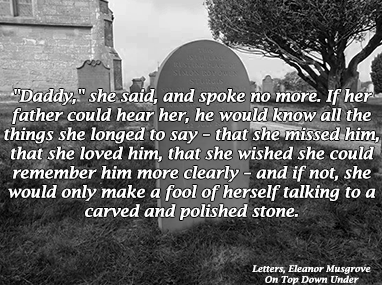 one another. She understands loss, her father died in WWI and she misses him. She visits the local churchyard, and the memorial that the village chipped in for for the twelve men who died, and talks to her father.
one another. She understands loss, her father died in WWI and she misses him. She visits the local churchyard, and the memorial that the village chipped in for for the twelve men who died, and talks to her father.
Iris Parsons, Bridget’s best friend/girlfriend, helps Bridget tend the memorial in the churchyard, keeping it clean and looking cared for. Iris’s father is on the memorial too, she also talks to him. They take the time to talk and de-stress together from their respective jobs at the churchyard in front of the memorial. Iris is a nurse, and while Bridget feels like the Angel of Death delivering sad telegrams to families, Iris has to tell families their son may have been shipped back but he now has gangrene, or he died from wound complications. Both young women are pragmatic and do their job well but another war means personal difficulties.
Another lovely short story by Eleanor Musgrove. Letters is not long on content but it’s filled with depth and humanity.
10) Buttercup – Jay Lewis Taylor
Well, Gilbert and Sullivan get a workout in this anthology. This time HMS Pinafore is being organised as a fundraiser for Red Cross with the men of the Alceste as the performers. Fairly appropriate for the naval service, I suppose.
There are several things afoot. One is a bet between officers that two of the men will actually kiss during the production. Neither heterosexual men would want to. One of the men, LH O’Shea, has been approached by one of the bet placers, Lieutenant Wilkins, who says he’ll split his winnings if O’Shea kisses Smudge, the narrator of this story. Wilkins would like to see AB “Smudge” Smith be made more than uncomfortable, he has a set against him, even if he has to use another man to do it. LH O’Shea needs the money for his sick mother but he doesn’t feel right about it so he tells Smudge.
“All well, AB?” the lieutenant asked.
“Yes, thank you, sir.” I turned round to face the house, and found myself being stared at by a trio of girls.
Lieutenant Hall waved. “Sisters,” he said. “Add in cousins and aunts, and I have more than Sir Joseph Porter does aboard Pinafore.”
The other part of the story is about some same sex attraction that also inadvertently comes to the attention of Smudge – he has a habit of being in the right place at the right time, or wrong time – depending on how you look at it. All I’ll add is Smudge spends a lot of time at Doc Bennett’s sick bay asking for some information or advice.
This is a witty and clever short. I don’t know why but I kept singing ‘and margaritas at the midnight buffet’ as I read. I guess it’s the idea of the sea and the cheeky vibe of the story.
11) Between Friends – Sandra Lindsey
Very lovely story about Carlos who has returned to apologise and declare his feelings to the man who took him in when he was younger. Dr Fernandes was kind and helpful, totally respectful and appropriate, never taking advantage of what was probably an obvious crush by Carlos. Although now, five years after being away serving on rubber ships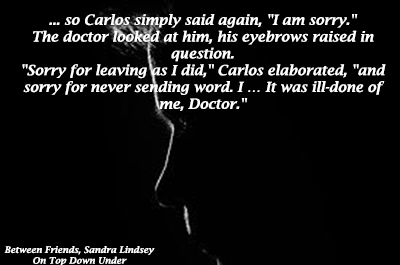 and boats and travelling the length and breadth of Brazil, maturing, Carlos is certain beyond doubt that he has much stronger feelings for the doctor, who is fifteen years his senior.
and boats and travelling the length and breadth of Brazil, maturing, Carlos is certain beyond doubt that he has much stronger feelings for the doctor, who is fifteen years his senior.
He hadn’t seemed to have aged a day. Thick dark hair, close-cropped, framed his fine-featured face. The doctor had always seemed unaware of his beauty, which only increased Carlos’s desire to trace his fingertips along the doctor’s cheekbones, to feel the sudden change from smooth dark skin to tight curled hair …
Carlos knows now is the time to be open with Dr Fernandes – Luiz – and tell him how he feels before he heads off to join the army and be part of the war. I would have loved more of this enchanting story. I loved the two main characters and had my fingers crossed for them, wondering what became of them in the end.
12) – From Air to There – Michelle Peart
It’s spring 1944 when this story starts. Puppet, nicknamed for his ability to use his parachute like a puppeteer, is on board a Dakota that’s in the middle of heavy trace and artillery fire over France.
The constant flickers from the tracer bullets lighting the glass next to me were giving me an eye-headache and the urge to move away was strong, but we were lined up in jumping order and I’d never have dared disobey my sergeant, Wide-Fred.
The men have no choice but to parachute into the crossfire, and Puppet, aka Colin, lands on a barn – after some initial tree hits and some mud.
Where were Slug and Nip? And Fred? Did they make it? Was Fred’s wife now a widow? And his children without a father? I shook the thoughts from my head and replaced them with instinct. I needed to get out of the cold mud and find protection from the enemy.
As luck would have it, he ends up at a French resistance fighter’s farm. Nineteen year old Henri tends pigs and lives on his own – his parents both succumbed to tuberculosis and his older brother was taken by the Germans.
Puppet has a damaged knee and Henri poultices and stitches it up as best he can. After a few days to recover they have to make a journey to Switzerland, including train trips, lots of papers, the Alps, and a great deal of nerve shown by both men. The plan is that Puppet will be handed over to a trusted Swiss contact and sent back to England. This isn’t Henri’s first time at the rodeo but it is Puppet’s. It’s always dangerous. Puppet faces an arduous questioning and POW internment if caught. Henri faces worse.
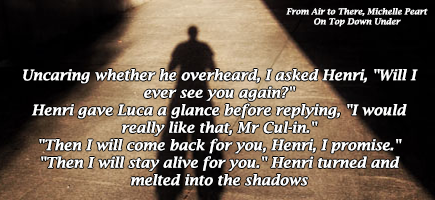
This books starts with a bang, you get to know the men on the Dakota just prior to trouble and as it’s about to go down. You get to know that Puppet, real name Colin, had a lover named Bert whose picture he keeps in his pocket, along with the letter from his mother telling him his ‘friend’ the milkman died in battle… and not even twenty-one.
A lot of depth was injected into this short story. I believe it’s the longest story in the anthology and it still went by too quickly. From Air to There is writing with heart. There’s suspense, strong emotion and character depth. The ending was nice. Gripping writing.
13) We’re Out of Hero Fabric – Andrea Demetrius
This is an interesting story set in Romania just prior to their change of sides in WWII.
Camil is from a wealthy family in Bucharest who was at his family’s oil plant when an explosion occurred and he lost most of his hearing. He also walks with a cane. We’re Out of Hero Fabric is a very introspective story told from Camil’s POV. His father doesn’t accept that Camil’s hearing can’t get better and has pushed him to listen more intently and improve himself. He wants his son to be whole and take over the business. Camil is a journalist but rather than cover political events as his father would prefer – if journalism is his want – Camil chooses theatre and the arts. Although Camil’s family name and one particular political observation manage to make a very significant change. His lover is also allowed home from the Front, if only Apostol weren’t so dedicated to the men under his command he might stay.
Camil starts out as a rather melancholy narrator and I found myself unsure of the story but once I found a rhythm with the writer, and once I could see Camil’s difficulties in a hard time, his selfless dedication to his lover, Apostol, the story was much better. The quality of writing was high and it’s a story about a place and side of WWII I didn’t know much about at all.
14) See – Adam Fitzroy
Set around a lake in Germany, I think, but no matter, the place isn’t the primary aspect, nor the side. It’s really about two men. Two men who connect while somewhere idyllic early in the morning. Naked and sharing a connection, the sense of serenity and sensuality they take while away from the war for just a short while.

See is a very short but gorgeously written story. Adam Fitzroy never lets me down with his subtleties and imagery and elegant use of language. That’s all I need to say.
15) Across a Thousand Miles – Barry Brennessel
China’s important role in WWII is mostly overlooked in textbooks, discussions, documentaries and movies. Britain and its allies are lauded but not China. If you ever have a desire to learn more about how big an impact China had, and mostly left to themselves to fight Japan because the war was always about Britain at all costs, you really should. It is a piece of history that is bloody and tough. It created major positive outcomes for the allies, and cost a lot of lives. It should not be forgotten.
Hsü Bao has been given an America dime by an airman and he thinks it’s the most remarkable thing he’s seen… outside of Che’en Guanyu. It’s a work of art to Hsü Bao and his family, including his eight year old brother, Xiong. But dimes and who is on the coin are not the only thing up for discussion. His parents talk of worries in whispers where Bao has to tiptoe to listen in.
Planes. Raids. Japan. There were a few other words I heard, but these three provided me with all I needed to know. I had figured out why the American pilots had shown up on our shores. Did this mean more Americans? The thought of bashing Japan made me tingle inside a little. But it also tied my stomach in knots. I wanted to tell Guanyu immediately.
To Bao and Guanyu, what the American pilots do is inspiring and pushes their thoughts of travel to new limits. Young boys who should have a lifetime of dreams.
“Imagine the journey those American pilots have been on,” Guanyu said, “soaring through the air. Across a thousand miles. That will be us. On trains. On ships. Maybe even on a plane one day. From Shangrao to Běipíng to … everywhere.”
Hsü Bao also has deep feelings for Che’en Guanyu, more than just friendship, and initially wonders if those feelings are reciprocated. He very much wants them to be. It’s a discovery of love in a difficult time and place.

Everything comes to a head quickly. Yes, Guanyu reciprocates Bao’s feelings and their innocent love is a sweetness in amongst growing and soon to be acute horror.
I tried to push images out of my head. I just couldn’t stop thinking about Xiong. If the Japanese searched our house, and found the coin and the whistle …
Barry Brennessel writes young love and innocence during a time of turmoil beautifully. And so it is with Hsü Bao and Ch’en Guanyu, fifteen year old boys experiencing first love in a tumultuous place in history, amid China and Japan’s animosity and war. Amid Japan’s ‘pacification’ of the Chinese. I wanted to know what happened next because it left me with a hurt heart but a smidgen of hope. Oh, how I wanted to keep reading this story.
16) Wild Flowers – J. L. Morrow
Set in Berlin right at the end of the war, Henny is working on the bombed out remains of Berlin with other women. She reflects on her girlfriend Anna who was killed on her way to work and her friends who were taken away for not fitting the Reich’s ideal.
I lost so many friends during the war. So many of them, I don’t know if they lived or died. Felice, the ballet dancer with dark eyes and a sharp wit, because she was a Jew. Gerda, the writer, who had a good heart for all she made my head ache with her rhetoric, because she was outspoken and a troublemaker. They took them away, to Ravensbrück and to Bergen-Belsen, and I never heard from them again.
Now an attractive young woman working on the ruins with Henny has caught her eye. Ruth is vivacious in spite of the times and seems to be somewhat optimistic in a grey world. These women are the Trümmerfrau, or rubble women. They have an interesting part in German history but some of the stories about the Trümmerfrau over time are slightly different to the actuality.
For those who may be interested, this is a further and excellent look at the Trümmerfrau by German historian Leonie Treber.
http://www.dw.com/en/dismantling-the-german-myth-of-tr%C3%BCmmerfrauen/a-18083725
Nicely written with strong imagery and emotion, and a touch of feminism, Wild Flowers adds another piece to this WWII anthology in a different, newly post war Germany.
17) Better to Die – Charlie Cochrane
This is set over a period of time from the 1970’s to the 90’s as narrator Jamie quickly grows up. Jamie likes to walk home from school through the war graves at the local churchyard. Even into high school he visits the graves as regularly as he can. Once he enters med school, and he’s more busy, he finds it harder to get there like he once did, although he still visits on holidays. His main interest has always been on Captain H.R. Gore-Davis who was buried in 1953. It always seemed odd as the date on the headstone wasn’t right for WWII or the Korean War. Captain Gore-Davis’s family is old money from Wales so it’s even more inexplicable as to why he’s buried in Hertfordshire.
Gore-Davis was a puzzle, though. He’d died in 1953, which was after Korea, and Mum said he’d probably died in a terrible accident during training. It seemed the best explanation at the time.
Jamie meets a psych student, Ben, who he has more interest in than anyone else, outside his passion over what happened to Captain Gore-Davis. Ben and Jamie are reading some psych journals when the name of Jamie’s Captain pops up. Ben and Jamie are mostly living together by now and happy until Jamie starts having vivid and recurring dreams about Gore-Davis. It also seeps over into his waking life and it now seems he is seeing the man in real life. Ben tries to help but it isn’t easy competing with a dead man. It isn’t easy when the Captain seems to be so real. Jamie is sure there is something he has to do for Rhys, the name the Captain prefers.
What a great way to finish off this anthology. Haunting and powerful and although not set in WWII it still has a connection.
Overall:
This is another strong, poignant, well researched and edited anthology from Manifold Press, this time set amidst and around WWII. It follows on the back of their equally good WWI anthology A Pride of Poppies – reviewed on this blog here.
So I am specific, because we do lean towards our fair share of gay romance on this blog, Call to Arms: Modern LGBTQ+ Fiction of the Second World War is queer fiction, not MM. A couple of characters return for a sequel here but I only know that because I just happened to remember them, it was nice to see they’re still happy, the rest were all new characters. There are some standout stories but across the board each short is strong and they span several countries, years, and letters within the rainbow alphabet. I would have loved more length with most of these stories but only because they’re so good. I was more than happy with most of these as they stood, although I wouldn’t complain if some found their way into longer novellas or novels.
I really do love a good short story. If you can tell me a heartfelt tale in a limited word count I am in total awe, and that mission was well and truly accomplished. I also want to give mention to Heloise Mezen for meticulously compiling the anthology. I can’t recommend Call to Arms highly enough. 5 Stars!


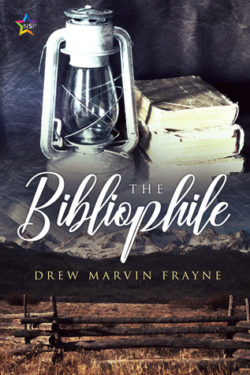


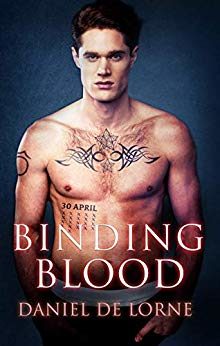
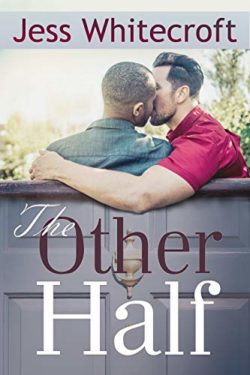
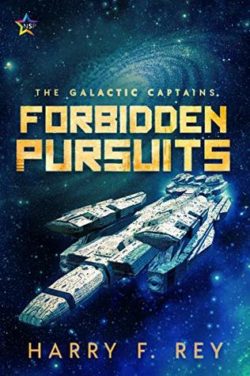


[…] ” … another strong, poignant, well researched and edited anthology from Manifold Press &… Undated review by Kazza K at On Top Down Under Reviews […]
[…] “I really do love a good short story. If you can tell me a heartfelt tale in a limited word co… […]
It’s so rare to enjoy all the stories in an anthology. I’ve always been fascinated by WWII. It’s very important to get the history right. I especially love the quote from The Boy Left Behind. Children often understand things with the simplest of explanations.
Great review. This looks like a fantastic anthology.
This is a wonderful collaboration and something Manifold, the editor, and the authors should be proud of.
Thanks, Cindi 🙂
[…] Find the full review for all seventeen authors here […]
[…] On Top Down Under Book Reviews with Substance: 5 stars from Kazza K […]